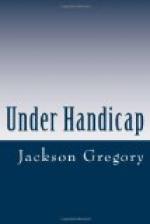Mr. Crawford did not again refer to the bad news which he had brought, but instead seemed to have forgotten it. He asked Conniston question after question, seeking significant details, demanding to know how many feet the ditch had been driven upon each separate day of the week, what difficulties had been met, how the men did the parts allotted them, what Truxton counted upon accomplishing upon each day to come. And after ten minutes of sharp, quick questions he leaned forward and, with his eyes steady and searching upon Conniston’s, demanded, abruptly:
“Is Truxton showing any signs of nervous irritability?”
“Yes.” Conniston hesitated, wondering what was in the other man’s thoughts. He began an explanation such as he had made Argyl, but Mr. Crawford cut him short.
“That will do. Thank you. That is all that I wanted to know.”
He got to his feet and strode back and forth in the little room, his brows bunched together. Conniston, seeing for the first time in this man whom he had held unendingly resourceful, indomitable, signs of a militating anxiety, felt a sudden chill at his heart. Were they, after all, playing a losing game? Was the combination of desert and Swinnerton and capital going to prove too much for them? Was John Crawford even now looking clearly into the future and seeing himself a beaten, broken man?
For a moment of torture, during which he realized to the uttermost what success would mean, what failure, he feared that the vision which he had thought to have glimpsed through this sturdy pioneer’s eyes was the true vision, feared that the fight was going out of John Crawford.
And a moment later a little shiver tingled through him as John Crawford stopped in front of him, looking down at him, as he saw that the make-up of this man was not broken, but that it was being bent like a powerful spring which draws its strength from outside pressure. He thought swiftly that the greater the weight put upon a powerful spring the greater was its recoil, the greater weights might it fling aside. Mr. Crawford was half smiling. His lips were calm. In his eyes there was no hint of fear or of failure. Instead a steady light there spoke with clear forcefulness of an unshaken determination, and more than hinted of a certain grim joy of combat.
“Young man,” he said, almost gently, “you are mighty fortunate.”
Conniston rose, making no reply, as he waited for an explanation.
“Yes, mighty fortunate. You are taking hold. I know what you were when you came to us; I know what you are now. I can see what you are going to grow to be. I congratulate you. And I congratulate you upon being placed in a position from which you are going to see the biggest fight that was ever heard of in this part of the country. Things are going dead against us these days. Do you know what that means?” He squared his shoulders, and for a moment his lips came together in a straight line. Then he smiled again.




